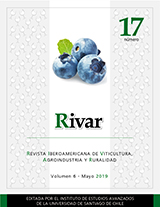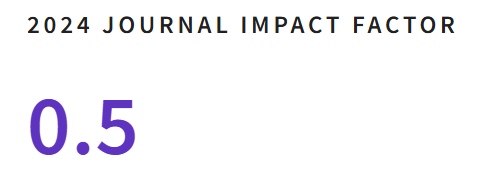La vuelta al terroir: el despertar de la cultura del vino en España
DOI:
https://doi.org/10.35588/rivar.v6i17.3916Keywords:
terroir, vino, Denominaciones de Origen, España, movimientos sociales, ámbito ruralAbstract
Exploramos, en el presente artículo, el surgimiento y debate actual en torno al movimiento terroirista en España desde la perspectiva de los movimientos sociales y rurales. La transformación de la escena vitivinícola española se ha convertido en un fenómeno objeto de estudio desde el ámbito académico, político y social: España cuenta con la mayor superficie de viñedos del mundo, el mayor volumen de exportación y el precio medio de venta de litro de vino más barato. Además, carece de políticas de zonificación, lo que hace que España sea única entre los países tradicionalmente productores de vino —como Francia, Italia o Portugal. Sin embargo, un grupo de productores desafía el modelo vitícola industrial en España, afianzando redes en áreas rurales de todo el país y participando en acciones nacionales e internacionales con el objetivo de producir vinos de calidad y elevados precios, recuperando regiones tradicionalmente productivas, variedades de uva autóctonas y restableciendo la cultura del vino en España. Si bien el movimiento muestra tendencias elitistas, es radical en su desafío a grandes empresas, industrias y cooperativas: un poderoso lobby que influye en el actual sistema de gobernanza del sector basado en el sistema de Denominaciones de Origen.
Downloads
References
Alonso González, P. & Parga Dans, E. (2018). “Organic Labeling Controversies: a Means to an End within Global Value Chains”. Renewable agriculture and food systems, 1-6 [en línea] doi:doi:10.1017/S1742170518000455 (consultado 20-1-19).
______. (2017). “Furanchos and Adegas: Exploring Symmetry through Wine Cultures in Galicia and Alentejo”. Cultural Geographies 24(4): 639-646.
Alonso González, P.; Parga Dans, E. & Macías Vázquez, A. (2017). “The Political Economy of Wine: How Terroir and Intra-sector Dynamics Affect Land Use in Spain”. Land Use Policy 66: 288-292.
Alonso Santos, J.L. (2012). “Vinos de calidad y denominaciones de origen: fricciones recientes en los consejos reguladores. La experiencia en Castilla y León”. En: Frutos Mejías, L.M. & Ruiz Budría, E. (eds.). (2012). Los productos con Indicación Geográfica en el sistema agroalimentario español. Tradición y modernidad. Zaragoza, Institución Fernando el Católico: 109-124.
Aylward, D. (2008). “Towards a Cultural Economy Paradigm for the Australian Wine Industry”. Prometheus 26(4): 373-385.
Barbera, F. & Audifredi, S. (2012). “In Pursuit of Quality. The Institutional Change of Wine Production Market in Piedmont”. Sociologia Ruralis 52(3): 311-331.
Barco Royo, E. (2015). “La configuración del sector vitivinícola en la Denominación de Origen Calificada Rioja. Parte I: caracterización”. RIVAR. Revista Iberoamericana de Viticultura, Agroindustria y Ruralidad 5(2): 40-63.
Barke, M. (1997). “‘Lo que ha de ser no puede faltar’ (‘what has to be cannot be avoided’): phylloxera and the demise of the Málaga wine industry”. Journal of Wine Research 8(3): 139-158.
Barrey, S. & Teil, G. (2011). “Faire la preuve de l’«authenticité» du patrimoine alimentaire. Le cas des vins de terroir”. Anthropology of Food 8: 1-20 [en línea] doi:http://aof.revues.org/6783 (consultado 20-1-19).
Bérard, L. & Marchenay, P. (1995). “Lieux, temps et preuves. La construction sociale des produits de terroir”. Terrain 24: 153-164.
Bou, E.; Sauquet, A. & Canestrino, R. (2008). Collective Networks and Communities of Practice: the Transformation of the Priorat Wine Region. Siena, 4th International Conference of the Academy of Wine Business Research.
Bové Sans, M.À. (2013). Innovació en indústries tradicionals: la (r)evolució vitivinícola del Priorat com a cas d’èxit. Tarragona, Rovira i Virgili.
Charters, S. (2006). Wine and Society: the Social and Cultural Context of a Drink. Londres, Routledge.
Chiffoleau, Y.; Dreyfus, F. & Touzard, J.M. (2012). “Ethics in French Wine Cooperatives: Part of Social Movement?”. En: Vaughan Thomas, E.; Jiggins, J. & Rozel Farnworth C. (eds.). (2012). Creating Food Futures: Trade, Ethics and the Environment. Milton, Ashgate: 131-148.
Club Matador. (2015). Manifiesto Club Matador: Los viñedos de excepción [en línea] http://clubmatador.com/wp-content/uploads/2015/12/Manifiesto-Club-Matador.pdf (consultado 20-1-19).
Cólogan, C. (2016). Tenerife Wine. Santa Cruz de Tenerife, Cabildo de Tenerife.
Crenn, C. & Techoueyres, I. (2007). “Local Heritage to Singularize a Wine Terroir: the Example of Pays Foyen (Gironde, France)”. Anthropology of Food S2.
Davidson, R. (2012). “The Priorat and the Landscaping of Catalan Terroir”. En: Ramon Resina, J. & Viestenz, W. (eds.). (2012). The New Ruralism. Madrid, Iberoamericana, 93-108.
Daynes, S. (2013). “The Social Life of Terroir among Bordeaux Winemakers”. En: Black, R.E. & Ulin, R.C. (eds.). (2013). Wine and Culture: Vineyard to Glass. Londres, Bloomsbury, 15-32.
Demossier, M. (2011). “Beyond Terroir: Territorial Construction, Hegemonic Discourses, and French Wine Culture”. Journal of the Royal Anthropological Institute 17(4): 685-705.
Diani, M. (1992). “The Concept of Social Movement”. The sociological review 40(1): 1-25.
DO Rías Baixas. (2015). Informe Exercicio 2015. Pontevedra, Consello Regulador Rías Baixas.
DOCa “Rioja”. (2014). Pliego de condiciones de la Denominación de Origen Protegida “Rioja”. Madrid, MAPAMA.
Esteban Rodríguez, S. & Climent López, E. (2017). “Los mundos de producción de las denominaciones de origen protegidas del vino en España: disparidad de convenciones tecnológicas y comerciales”. Economía Agraria y Recursos Naturales 17(1): 101-125.
Fernández, E. (2010). “Unsuccessful Responses to Quality Uncertainty: Brands in Spain’s Sherry Industry, 1920-1990”. Business History 52(1): 100-119.
Fernández, E. (2012). “Especialización en baja calidad: España y el mercado internacional del vino, 1950-1990”. Historia Agraria 56: 41-76.
Gade, D.W. (2004). “Tradition, Territory and Terroir in French Viniculture: Cassis, France, and Appellation Contrôlée”. Annals of the Association of American Geographers 94(4), 848-867.
Giordano, C. (1987). “The ‘Wine War’ between France and Italy: Ethno-Anthropological Aspects of the European Community”. Sociologia Ruralis 27(1): 56-66 [en línea] doi:10.1111/j.1467-9523.1987.tb00317.x (consultado 20-1-19).
Giuliani, A.P.; Lorenzoni, G. & Visentin, M. (2016). “New Wines in New Bottles: The ‘Renaissance’ of the Italian Wine Industry”. Industry and Innovation 22(8): 729-752.
Gobierno de España. (2015). “BOE-A-2004-18384. Ley 6/2015, de 12 de mayo, de Denominaciones de Origen e Indicaciones Geográficas protegidas de ámbito territorial supraautonómico".
______. (2004). “ORDEN APA/3465/2004, de 20 de octubre, por la que se aprueba el Reglamento de la Denominación de Origen Calificada "Rioja" y de su Consejo Regulador”.
Goldberg, K.D. (2011). “Acidity and Power: the Politics of Natural Wine in Nineteenth-Century Germany”. Food and Foodways 19(4): 294-313.
González González, A. (2015). El control de las administraciones públicas en el sector vitivinícola: el papel de los consejos reguladores. Tesis doctoral. Madrid, UCM.
Goodman, D. & DuPuis, E.M. (2002). “Knowing Food and Growing Food: Beyond the Production-Consumption Debate in the Sociology of Agriculture”. Sociologia ruralis 42(1): 5-22 [en línea] doi:10.1111/1467-9523.00199 (consultado 20-1-19).
Gutiérrez, L. (2017). Los nuevos viñadores: una nueva generación de viticultores españoles. Madrid, Planeta Gastro.
Hannin, H.; Codron, J. & Thoyer, S. (2000). “The International Organization for Vine and Wine and the World Trade Organization: Standardization Issues in the Wine Sector”. Cahiers d'Économie et Sociologie Rurales 55/56: 111-138.
Hennion, A. (2004). Pragmatics of taste. Londres, Wiley.
Jung, Y. (2016). “Re†Creating Economic and Cultural Values in Bulgaria’s Wine Industry: from an Economy of Quantity to an Economy of Quality?”. Economic Anthropology 3(2): 280-292.
______. (2014). “Tasting and Judging the Unknown Terroir of the Bulgarian Wine: the Political Economy of Sensory Experience”. Food and Foodways 22(1-2): 24-47.
Krzywoszynska, A. (2015). “Wine is not Coca-Cola: Marketization and Taste in Alternative Food Networks”. Agriculture and Human Values 32(3), 491-503.
Manifiesto de los Vinos Radicales. (2015). “Manifiesto de los vinos radicales” [en línea] https://www.gastroactitud.com/userfiles/files/pistas/manifiesto-vinos-radicales.pdf (consultado 20-1-19).
Martin, G. (2015). Understanding social movements. Londres y New York, Routledge.
Meloni, G. & Swinnen, J. (2013). “The Political Economy of European Wine Regulations”. Journal of Wine Economics 8(3): 244-284.
OIV (Organización Internacional de la Viña y del Viño). (2016). “Balance 2016 de la OIV sobre la situación vitícola mundial” [en línea] http://www.oiv.int/es/actualidad-de-la-oiv/la-produccion-mundial-de-vino-en-2016-se-estima-en-259-mill-hl (consultado 20-1-19).
Pardo Calle, C.; Segovia González, M.; Paneque Macias, P. & Espino Gonzalo, C. (2011). “An Approach to Zoning in the Wine Growing Regions of ‘Jerez-Xérès-Sherry’ and ‘Manzanilla-Sanlúcar de Barrameda’ (Cádiz, Spain)”. Spanish Journal of Agricultural Research 9(3): 831-843.
Parga Dans, E. & Alonso González, P. (2018). “From Paper to Soil: the Impact of New EU Alcoholic Drinks Labeling Regulations for Wine Regions”. Journal of Consumer Protection and Food Safety 13(1): 89-94.
______. (2017). “‘Marketing Quality’ in the Food Sector: Towards a Critical Engagement with the ‘Quality Turn’ in Wine”. Geoforum 85: 5-8.
Porta i Tallant, A. (2016). “Battle Lines Drawn in Spain's Wine War. Wine-Searcher” [en línea] http://www.wine-searcher.com/m/2016/10/battle-lines-drawn-in-spain-s-wine-war
Rouvellac, É. (2013). “Le terroir, essai d'une réflexion géographique à travers la viticulture, volume 2”. Geography. Limoges, Université de Limoges.
Soutelo Vázquez, R. (2001). “Las uvas de la unión. Organización y movilización campesina en la vitivinicultura gallega: el Ribeiro ourensano, 1880-1936”. Historia Agraria 25: 121-156.
Starr, A. (2010). “Local Food: a Social Movement?”. Cultural Studies Critical Methodologies 10(6): 479-490.
Szedlak, A. (2005). “Que font-ils ailleurs? Une forme d’organisation collective originale dans la filière vitivinicole hongroise: l’Association Tokaj Renaissance”. Revue des oenologues et des techniques vitivinicoles et oenologicques 32(117): 62-66.
Teil, G. (2017). “Protecting Appellations of Origin: One Hundred Years of Efforts and Debates”. En: Van Caenegem, W. & Cleary, J. (eds.). (2017). The Importance of Place: Geographical Indications as a Tool for Local and Regional Development. Cham, Springer: 147-171.
______. (2014). “Nature, the CoAuthor of Its Products? An Analysis of the Recent Controversy Over Rejected AOC Wines in France”. The Journal of World Intellectual Property 17(3-4): 96-113.
______. (2011). “No Such Thing as Terroir? Objectivities and the Regimes of Existence of Objects”. Science, Technology & Human Values 37(5): 165-193.
______. (2010). “Le terroir existe-t-il?”. Revue Française d'Oenologie 244: 2-6.
Trubek, A.B. (2008). The taste of place a cultural journey into terroir. Berkeley, University of California Press.
Villanueva-Rey, P.; Vázquez-Rowe, I.; Moreira, M.T. & Feijoo, G. (2014). “Comparative Life Cycle Assessment in the Wine Sector: Biodynamic vs. Conventional Viticulture Activities in NW Spain”. Journal of Cleaner Production 65: 330-341.
Vinetur. (2017). “Una bodega española lidera las ventas de vino en Europa” [en línea] https://www.vinetur.com/2017112745615/una-bodega-espanola-lidera-las-ventas-de-vino-en-europa.html (consultado el 22-4-19).
Viñateros. (2017). “Viñateros: A Spanish Wine Revolution” [en línea] https://www.eventbrite.co.uk /e/vinateros-a-spanish-wine-revolution-tickets-28940914053 (consultado 20-1-19).
Wekerle, G.R. (2004). “Food Justice Movements: Policy, Planning and Networks”. Journal of Planning Education and Research 23(4): 378-386.
Whalen, P. (2010). “Whither Terroir in the Twenty-first Century: Burgundy’s Climats?”. Journal of Wine Research 21(2-3): 117-121.
Woods, M. (2008). “Social Movements and Rural Politics”. Journal of Rural studies 24(2): 129-137 [en línea] doi:https://doi.org/10.1016/j.jrurstud.2007.11.004 (consultado 20-1-19).
______. (2003). “Deconstructing Rural Protest: the Emergence of a New Social Movement”. Journal of Rural Studies 19(3): 309-325 [en línea] doi:https://doi.org/10.1016/S0743-0167(03)00008-1 (consultado 20-1-19).
Zhao, W. (2005). “Understanding Classifications: Empirical Evidence from the American and French Wine Industries”. Poetics 33(3-4): 179-200.









